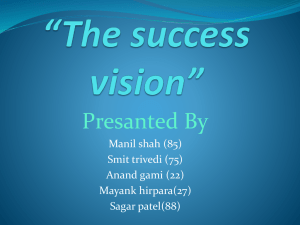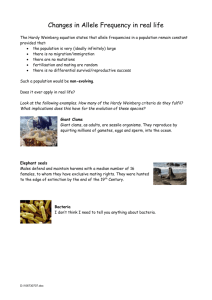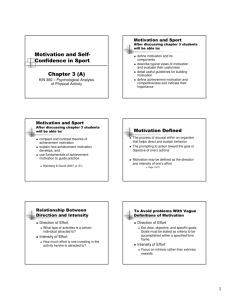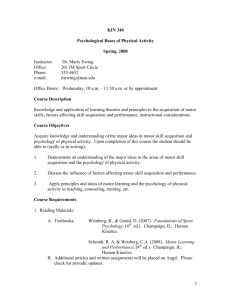Motivation and Self - Cal State LA
advertisement
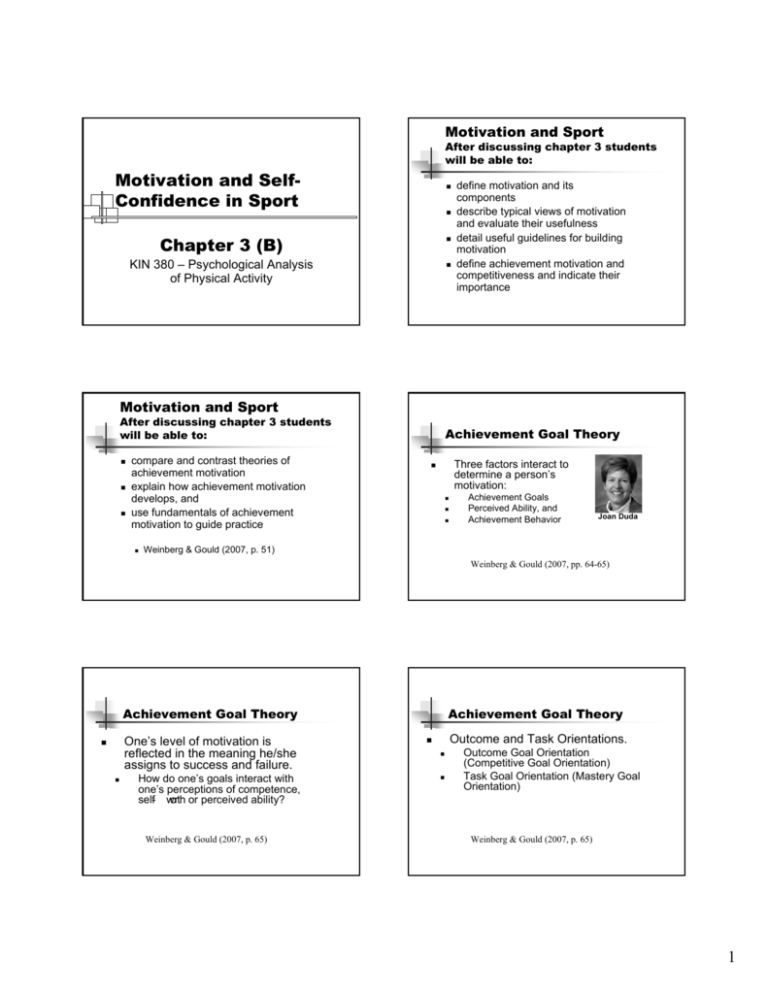
Motivation and Sport After discussing chapter 3 students will be able to: Motivation and SelfConfidence in Sport Chapter 3 (B) KIN 380 – Psychological Analysis of Physical Activity define motivation and its components describe typical views of motivation and evaluate their usefulness detail useful guidelines for building motivation define achievement motivation and competitiveness and indicate their importance Motivation and Sport After discussing chapter 3 students will be able to: compare and contrast theories of achievement motivation explain how achievement motivation develops, and use fundamentals of achievement motivation to guide practice Achievement Goal Theory Three factors interact to determine a person’s motivation: Achievement Goals Perceived Ability, and Achievement Behavior Joan Duda Weinberg & Gould (2007, p. 51) Weinberg & Gould (2007, pp. 64-65) Achievement Goal Theory One’s level of motivation is reflected in the meaning he/she assigns to success and failure. How do one’s goals interact with one’s perceptions of competence, self- worth or perceived ability? Weinberg & Gould (2007, p. 65) Achievement Goal Theory Outcome and Task Orientations. Outcome Goal Orientation (Competitive Goal Orientation) Task Goal Orientation (Mastery Goal Orientation) Weinberg & Gould (2007, p. 65) 1 Achievement Goal Theory Value of Task Orientation If outcome is poor, rather than increase effort one resorts to excuses. Tendency to enter “sure” win rather than uncertain situations. Tendency to select “lost cause” or tasks that are too difficult. An outcome goal orientation focuses on comparing performance with and defeating others. Task goal orientation focuses on comparing performance with personal standards and personal improvement. Achievement Goal Theory Problems with Outcome Orientation Which is a better orientation? Explain. Weinberg & Gould (2007, p. 65) Weinberg & Gould (2007, p. 65) Achievement Goal Theory Social Goal Orientation Competence is judged in terms of affiliation with the group and recognition by group members. A need to belong to and to be connected to the group. Achievement Goal Theory Entity Versus Incremental Goal Orientation What actions can the coach take to support a social goal oriented child? Achievement Goal Theory Importance of Motivational Climate A motivational climate of mastery or task goal orientation supports positive attitudes, increased effort, and effective learning strategies . A motivational climate of outcome is associated with maladaptive motivational patterns. Entity View – An outcome goal focus with the belief of one’s fixed ability. Incremental Focus – A task goal focus with the belief that change will follow hard work. Weinberg & Gould (2007, p. 66) Which is a better orientation? Explain. Entity views lead to negative self-thoughts and feelings (Li & Lee, 2004) Weinberg & Gould (2007, p. 66) Achievement Goal Theory What steps does a teacher or coach need to take to foster a positive Motivational Climate? Set mastery goals. Set reasonably difficult goals. Promote an incremental focus on one’s goals. Weinberg & Gould (2007, p. 67) 2 Competence Motivation Theory An athlete’s perceptions of control and self- worth and competence evaluations influence a positive motivational orientation. Motivation is influenced indirectly through the perceptions’ effect on affective or emotional states. For example: Feelings of high self-esteem & competence lead to increased effort, enjoyment, and the perception of having fun. Competence Motivation Theory Feedback and reinforcement Affect ○ enjoyment ○ anxiety ○ pride ○ happiness ○ shame Self-esteem/ perceived competence/ perceived control Motivational orientations ○intrinsic/extrinsic ○ task/outcome ○ trait/anxiety MOTIVATION Weiss & Chaumeton (1992, p. 90) Motivational orientations in sport. Theories of Achievement Motivation: Summary of Findings Theories of Achievement Motivation: Summary of Findings High Achiever Low Achiever Motivational orientation × motivation to achieve success Ø motivation to avoid failure Öfocus on pride of success Ø motivation to achieve success × motivation to avoid failure Öfocus on shame from failure Attributions Goals adopted Weinberg & Gould (2007, p. 68) Theories of Achievement Motivation: Summary of Findings Perceived competence and control High Achiever Low Achiever success = stable & internal control failure = unstable & external, not under control generally adopts task goals success = unstable & external, not under control failure = stable & internal control generally adopts outcome goals Weinberg & Gould (2007, p. 68) Theories of Achievement Motivation: Summary of Findings High Achiever Low Achiever High Achiever Low Achiever × perceived competence and can control achievement Øperceived competence and achievement is not in one’s control × challenges and strong competition Øchallenges and extremely strong or very weak competition Weinberg & Gould (2007, p. 68) Task choice performs poorly in Performance performs well in evaluative settings evaluative settings conditions Weinberg & Gould (2007, p. 68) 3 Stages in the Development of Achievement Motivation Autonomous competence stage Tips for Guiding Achievement Motivation Achievement behavior is the result of interaction of personal and situational factors. In a mastery motivational climate promote task/mastery and not outcome goals Monitor and alter attributional feedback <4 – mastering one’s environment and self- testing Social comparison stage >5 – comparing self to others Integrated stage compares and competes when appropriate and uses self- referenced standards Tips for Guiding Achievement Motivation (continued) Monitor, assess, and modify or correct inappropriate attributions Since the goals of competition and the goals of learning are diametrically opposed, separate between the learning and competition processes Enhance perceptions of competence and control Attributional Guidelines – Dos and Don’ts for Providing Instructor Feedback Dos the case of failure, identify what was not done that could have been done and reallocate effort. Identify the abilities that led to success Point out the effort that led to success Attributional Guidelines – Dos and Don’ts for Providing Instructor Feedback Don’ts the case of failure, avoid low - ability attributions Do not attribute success to luck Do not attribute success low task difficulty Questions? Comments? Do not make any insincere or false attributions of any kind 4


